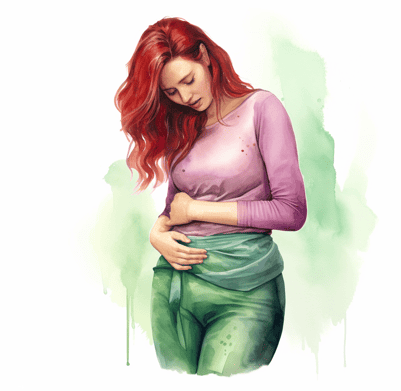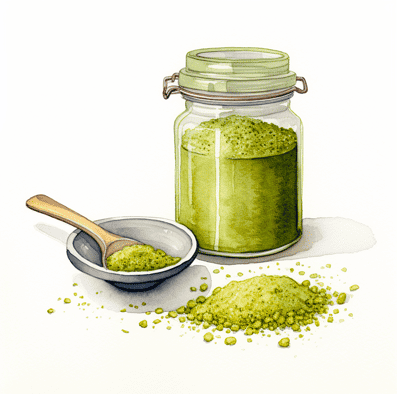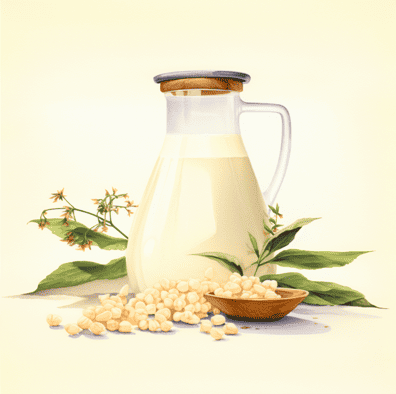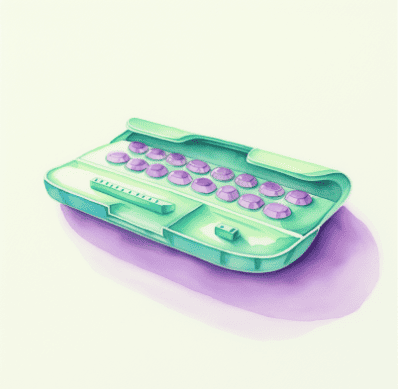
Does endometriosis cause acne?
Endometriosis doesn’t directly cause acne, although it can still indirectly contribute to it through hormonal imbalances. A plant-based diet can help balance hormones, manage endometriosis, and help improve skin health. Seaweed in particular could be an easy addition to your daily diet for helping endometriosis.
ABOUT ME
Be beauty. Be plant-based!
As a former Registered Nurse and avid plant-muncher, I’m in love with how simple plant-based foods make it easy to be beautiful.

You might also like:
The Miracle of Tea: Best Teas for Hormonal Balance
Navigating the dual challenges of endometriosis symptoms and skin issues can sometimes feel like an uphill battle, can’t it? From cramps that interfere with your daily routines to breakouts that make you want to hide, it would be great to have some clarity. You’re not alone in. Many of us have stood where you’re standing now, wondering, ‘Does endometriosis cause acne?’
From Endometriosis to Acne
Now that we’ve taken a close look at endometriosis, let’s turn our attention to hormones. These powerful little chemicals, while invisible to the naked eye, have a significant impact on our bodies and how we feel. Hormonal imbalance, a common sidekick of endometriosis, can be the secret culprit behind those pesky breakouts.
Hormonal imbalance essentially means that your body is producing too much or too little of certain hormones. In the case of endometriosis, the hormone estrogen often takes centre stage. Higher levels of estrogen can stimulate the overgrowth of endometrial tissue, contributing to endometriosis pain and inflammation.
But what does this have to do with acne? A lot, as it turns out. When our hormones are out of whack, it can lead to increased oil production in the skin, triggering acne breakouts. It’s like a greasy domino effect (ew!) – the oily skin clogs the pores, leading to inflammation and then – boom – your acne shows up.
But don’t lose hope, beautiful! There’s a whole range of acne types out there, from hormonal acne and cystic acne to severe acne, and each has its unique triggers and treatments. That’s why it’s so important to understand the link between endometriosis, hormones, and acne – so you can find the right solutions to help your skin glow.
Seaweed Magic for Balanced Hormones and Clear Skin
If you thought a plant-based lifestyle was only about embracing the greens on terra firma, think again! The sea is teeming with treasures that are just waiting to make your skin glow and hormones dance to their natural rhythm. I’m talking about seaweed, that miraculous marine flora that you might have overlooked until now.
Seaweed, it turns out, isn’t just for mermaids. These aquatic wonders are loaded with unique fibers and phytonutrients that aren’t found in your regular land-dwelling vegetables.

Think of them as the special agents in your diet, bringing with them a fleet of anticancer properties and potential anti-estrogen effects.
Why is this important?
Well, lower estrogen levels have been associated with a reduced risk of estrogen-dependent cancers like breast, endometrial, and ovarian cancers. Fun fact: Japanese women, who regularly incorporate seaweed in their diets, have among the lowest rates of these cancers. Now, that’s food for thought!
What’s more, adding just a little seaweed to your daily diet could do wonders for endometriosis sufferers. In a small study, women with endometriosis who consumed a tiny amount of dried, powdered bladderwrack (a common type of seaweed) experienced lengthened menstrual cycles, reduced duration of their periods, and – drumroll, please – significant relief from endometriosis pain.
One woman, who had irregular periods every 16 days that lasted for nine long days, noticed her cycle extend to a regular once-a-month event lasting just four days. All this magic from just a half-teaspoon of seaweed powder a day!
Yes, we need bigger studies to cement these findings, but this does shed light on the untapped potential of sea vegetables in managing hormonal conditions and promoting skin health. So next time you’re grocery shopping, why not stop by the seaweed aisle and invite some sea magic into your meals? From wrapping your sushi to sprinkling on your salads or soups, there are plenty of delicious ways to include seaweed in your plant-based diet.
Remember, the plant-based goddess realm isn’t limited to land. There’s a whole ocean out there brimming with nutrient-packed, hormone-balancing, skin-loving goodness!”
Plant-Based Strategies for Hormone Balance and Clear Skin
Embracing a plant-based lifestyle isn’t just about saving the planet, it’s about saving your skin and managing hormonal conditions like endometriosis too. Who knew that the veggies could also be your secret weapons in the fight against hormonal imbalances and skin problems?
A plant-based diet is rich in phytoestrogens, natural compounds found in certain fruits and veggies that can help balance estrogen levels in your body.
Foods like flaxseeds, soy, and berries are your best friends here. They’re like undercover agents, helping to keep those hormone levels in check.

And it doesn’t stop there. Consuming a rainbow of fruits and vegetables provides a powerhouse of antioxidants that can aid in reducing inflammation, a common factor in both endometriosis and acne. So, say yes to that colourful salad or that bowl of mixed berries. Your body will thank you.
But let’s be real – we’re all busy goddesses, and sometimes, convenience is key. Incorporating plant-based foods into your diet doesn’t have to be a chore. Simple changes like swapping dairy milk for almond milk in your morning cereal or choosing a veggie-packed stir-fry over fast food can make a world of difference.
And for our endometriosis sufferers with sensitive skin, avoiding dairy and processed foods might just give your skin that break it’s been longing for. These foods can trigger inflammation and oil production, leading to dreaded acne flare-ups.
Cutting Back on Meat and Dairy: A Win-Win for Endometriosis Warriors
Now, while we’re navigating the sea and land for plant-based wonders, let’s take a moment to talk about the ‘moo’s and ‘baa’s on our plates. If you’ve been looking for another reason to dial down on meat and dairy, here it is – reduced exposure to pollutants linked with endometriosis.
You see, the industrial farming practices often used to produce our meat and dairy products can lead to high levels of pollutants in these foods. When we consume them, we invite these unwelcome guests into our bodies, and research suggests they might just have a hand in aggravating endometriosis. Other hormone-disrupting chemicals like phthalates are linked to endometriosis and increased abdominal fat, aka weight gain.
So, cutting back on meat and dairy is like showing these pollutants the exit door. It’s a simple step that can go a long way in managing endometriosis symptoms and contributing to overall hormonal balance. Plus, it’s a fantastic excuse to explore more plant-based delicacies.
Remember, every bite you take is a chance to nourish your body, balance your hormones, and show your skin some love. So, why not make it plant-powered?”
Treating Endometriosis: Hormonal Treatments and Beyond
At this point, you’re probably thinking, ‘Enough with the problems, what about solutions?‘ And you’re right. Understanding is half the battle, but it doesn’t alleviate the endometriosis pain or clear up your skin.
When it comes to treating endometriosis, there are a variety of options to consider. Hormonal treatments, like birth control pills, patches, or intrauterine devices (IUDs), are often a go-to choice. These treatments work by controlling your menstrual cycle, slowing the growth of endometrial tissue, and reducing those agonising cramps.

But while hormonal treatments can be a lifesaver for many women, they are not a one-size-fits-all solution. Side effects can occur, and for some women, hormonal birth control might even contribute to skin problems. Sounds like a twisted irony, doesn’t it?
And then there are hormonal medications that specifically target androgens or ‘male hormones’ that all women have. These can be particularly helpful if you’re dealing with endometriosis and hormonal acne, as they aim to reduce oil production in the skin.
But remember, lovely ladies, treatment isn’t just about popping pills or applying creams. It’s about finding a comprehensive approach that fits your unique needs, and this is where our plant-based lifestyle comes into play. Stick with me as we delve into delicious foods and habits that can help balance those pesky hormones and pave the way to clearer skin.”
Understanding Endometriosis: Symptoms and Causes
Let’s first shed some light on our unwelcome guest, endometriosis. Endometriosis is a medical condition where tissue resembling the lining of the uterus grows outside the uterus. Sounds pretty rebellious, doesn’t it?
Common symptoms of endometriosis can range from uncomfortable to downright debilitating. They include severe pain during periods, chronic lower back and pelvic pain, pain during or after intercourse, and even issues related to fertility. Oh, and don’t forget about those unexpected ‘surprises’ that pop up when you least expect them, like gastrointestinal issues during your period.
Diagnosis of endometriosis typically comes through a procedure called laparoscopy, performed by a gynecologist. But here’s where things get even more complicated – the severity of your symptoms doesn’t always correlate with the extent of the endometriosis. A woman can have mild endometriosis with severe symptoms or severe endometriosis with relatively mild symptoms.
Frustrating, right?
So, what exactly causes this rebellious behavior of our body tissues? The exact cause of endometriosis remains unknown, however hormonal changes play a significant role. It’s like a hormonal rollercoaster that your body didn’t buy a ticket for, but ended up on anyway. And now you’re paying for it.
Dealing with Chronic and Inflammatory Conditions
Living with a chronic and inflammatory condition like endometriosis requires more than just a focused diet or a prescribed pill. It demands a comprehensive approach to your lifestyle. While your diet is one of the main actors on this stage, stress management, regular exercise, and a good night’s sleep are the supporting cast that really help to bring the show together.
Stress, whether physical or emotional, can mess with your hormone balance, adding fuel to the endometriosis fire. Regular calming practices like yoga, meditation, or even a relaxing bubble bath can help keep stress levels in check. These soothing habits act like a gentle lullaby to your hormones, helping them to stay balanced and play nice with your skin.
Regular exercise, on the other hand, is a natural inflammation buster. It helps regulate hormones, boosts circulation, and can reduce the pain associated with endometriosis. So, whether it’s a peaceful morning walk, a mid-day yoga session, or a fun dance class, find a way to move that brings joy to your life.
And let’s not forget about the restorative power of sleep. Quality shut-eye not only helps your body recover from the day’s stresses but also aids in balancing hormones. Not to mention, it gives your skin a chance to rejuvenate, supporting your pursuit of that clear, glowing complexion.
Does endometriosis cause acne? Navigating endometriosis and acne can indeed be challenging, but remember, you’re not alone. Your journey towards hormonal balance and clear skin is uniquely yours, but we’re with you every step of the way.
FAQ: Does Endometriosis Cause Acne?
Q: What are the skin symptoms of endometriosis?
A: Endometriosis primarily affects the pelvic region, not directly causing skin conditions. However, hormonal changes it triggers can lead to acne or oily skin.
Q: Can endometriosis cause chin acne?
A: Chin acne can result from hormonal imbalances, which might occur in endometriosis. It’s not a direct result of the disease, but a potential indirect effect.
Q: What gynaecological problems cause acne?
A: Conditions like Polycystic Ovary Syndrome (PCOS) can cause acne due to hormonal imbalances. Endometriosis may indirectly influence acne for similar reasons.
Q: What hormonal imbalance is causing my acne?
A: Hormonal acne is usually linked to fluctuations in androgens and progesterone. Conditions like endometriosis and PCOS can contribute to such imbalances.
Q: How do I know if my acne is hormonal or bacterial?
A: Hormonal acne often occurs on the lower face and around menstrual periods, while bacterial acne can pop up anywhere and anytime. A healthcare provider can provide a definitive diagnosis.
Q: Why am I getting cystic acne all of a sudden?
A: Sudden cystic acne might be due to hormonal changes, stress, or use of certain skincare products. In some cases, it could be a reaction to diet or certain medical conditions.
Q: How do you fix hormonal imbalance acne?
A: Treatment options include hormonal treatments, topicals, a healthy diet, and good skincare routine. Severe cases may require prescription medications.
Q: Does hormonal acne eventually go away?
A: Yes, with the right treatment and lifestyle changes, hormonal acne can improve over time.
Q: Can endometriosis lead to excessive bleeding and abdominal pain?
A: Yes, common symptoms of endometriosis include severe pain and heavy menstrual bleeding. If you experience these, seek advice from a healthcare provider.
Q: What should young women know about endometriosis and acne?
A: Young women, especially those with severe teenage acne, should understand that endometriosis can indirectly contribute to acne. If you’re dealing with persistent acne and pelvic pain, consult a healthcare provider about possible links to endometriosis.
Q: How can a healthy diet affect endometriosis and acne?
A: A healthy diet, especially plant-based, can help manage hormonal imbalances associated with endometriosis, potentially improving skin health.
Q: What roles do fallopian tubes and blood vessels play in endometriosis?
A: Endometriosis occurs when tissue similar to the uterine lining grows outside the uterus, possibly even on the fallopian tubes. These growths can form their own blood vessels, leading to pain and other symptoms.